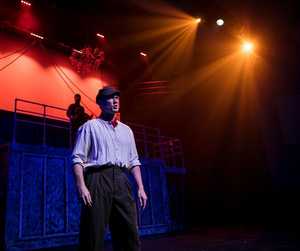Review: AMAZING GRACE at Servant Stage
Servant Stage Presents First Regional Production In Concert

It's almost certainly the best known hymn in the English language - or on bagpipe - but most people know little or nothing about how the hymn "Amazing Grace" came to be written by an abolitionist English priest who was a former active slave trader. Philadelphia native Christopher Smith wrote the story of John Newton's life as a musical, first brought to Broadway in 2015, to tell the surprising and enlightening tale.
While Newton went from enslaving to a minister of the Gospel, Smith's story isn't quite gospel. Like the television show THE CROWN, AMAZING GRACE is an adaptation of facts that serves to package a long and complex story into a neater, more vigorous tale that has stage presence.
Directed by Wally Calderon, the intrepid musical director of Lancaster's Servant Stage Company, AMAZING GRACE met COVID requirements for the theater by being adapted as an on-stage concert, removing some non-musical scenes and packaging the story into 90 minutes of some very sophisticated stage music. (The show was originally going to be produced in full but the change to concert was a last-minute decision that had little actual impact, and that was not readily apparent. Kudos to the production team and performers for the seamless switch.)
Adler Roberts as the lead, John Newton, has both a dynamic stage presence and a fine voice, put on display at the start in "Truly Alive," where he and Robert Bigley as his father argue over the age old father and son topic of what really makes a man a man. For John, it's sailing and exploring as part of his father's slave trade, as well as some raffish disreputable behavior. If there's a whiff of the story of the prodigal son to Newton's story, you won't be alone in seeing it.
John's bad-boy life sits badly with his childhood sweetheart, Mary, played delightfully by Kayla Klase. She misses the young John who wrote and sang music rather than auctioning slaves callously on the docks. It's no surprise that despite coming from a slave-owning family, she's quickly able to understand the abolitionist movement and is eventually persuaded to become a silent but useful activist
While John is impressed by force into the Royal Navy - which likes him no better than he likes it - and takes on guarding slaving ships in Africa, and while his ship is wrecked and he becomes a slave of the African Princess Peyai ( an outstanding performance in all ways by Lindsey Grimble-Adams)... an incident that does not seem to have caused him to rethink slavery at allay the time, surprisingly. Mary has brought herself to the attention of one Major Gray, who is in charge of local military activity regarding the slave trade. John's nowhere to be found and Mary has the looks and voice of an angel; surely no good can come of her association with the older, bachelor officer, and in the best theatrical tradition, no good is indeed what follows.
Major Gray is played by Duane Hespell with the sure-footed and sure-voiced movement and patter of a Gilbert and Sullivan comedic performer. You can practically see his (invisible) mustache twirl as he detects Mary's spying yet still intends to keep her with him. It's a bit of a classic stock character, yet tremendous fun to see again in a musical.
Can John be saved from his own captivity? Can he be saved from himself? Can Mary escape from the clutches of the Major? Will she be able to stand up for her abolitionist beliefs without going to prison?
John experiences a conversion of heart during a near-shipwreck, in time for him to become the hero the audience knows he must become, and go on to compose "Amazing Grace." It's a faster process than it was in real life, and a bit neatly packaged to make the show flow, but it's still a satisfying ending, with the namesake song wisely kept for the end, and basically an astounding true story if much condensed for stage storytelling.
The music of the show is well-composed as well as performed, and the audience is treated to African music and song as well as the usual slick Broadway content. As a concert, it flows, though with the trimming of some scenes some of the emotional impact is lost; just how disliked Newton was in his youth isn't fully captured, nor is some of the African slaves' plight. It's still a rousing set of music, and something you'll enjoy long after you leave You'll also learn considerably more than you did about the real issues of African slavery.
Performed by Servant Stage at Lancaster Bible College through October 17. Visit ServantStage.org. /
Reader Reviews
Videos

